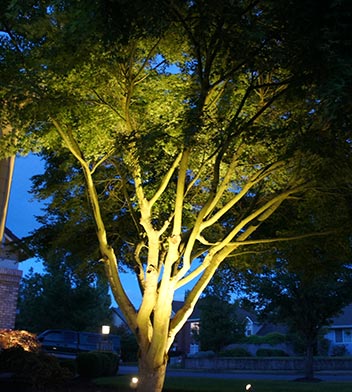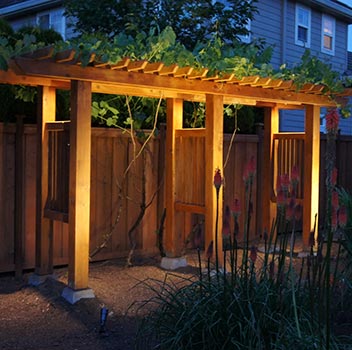
Landscape lighting is that finishing touch, highlighting both architectural beauty as well as interesting and inviting landscape-design features. Although Eugene landscape lighting can be installed by homeowners, success is dependent on whether the installer feels comfortable with planning the design and working with electricity. In most cases, hiring an experienced Eugene landscape lighting design expert is a good investment.
There are many variables in designing the right lighting: electrical considerations, light fixtures, proper highlighting of landscaping and architectural features and system controls.
Electrical Considerations
While solar, light-emitting diode (LED) lighting is available, the quality is not yet fully developed. Therefore, the first component of a lighting system is electricity.
Landscape lighting is usually lower voltage than household lighting; however, lighting possibilities are not impacted by this safe, less-expensive voltage. A properly installed lighting system requires a step-down transformer, a waterproof hub from which electrical cables can extend, light fixtures, a means of controlling the lights and cables.
Fixtures
In a well-designed lighting plan, a variety of lighting fixtures work together to complete the design. Each fixture has a specific purpose.
- Garden lights have opaque canopies that direct the light downward onto plantings.
- Bullet lights direct a narrow beam towards stand-out architectural and landscape features.
- Wash lights diffuse light for a softer look.
- Down lights are secured in trees and illuminate the area underneath.
- Well lights are buried, allowing features to be illuminated without an obvious fixture.

Design
Good designers understand how to position and combine fixtures so that the result flows naturally. Poorly placed lighting can be harsh or ignore common landscape features that are lovely when lit correctly.
The Right Bulbs
Regardless of the lighting plan, homeowners must choose between using LED or halogen bulbs.
LED bulbs are dramatically more expensive. However, they are also energy-efficient and can last up to 20 years — compared to two years for the average halogen bulb. Other than expense, LEDs main drawback is color. LED bulbs produce a cool, bluish light.
Halogen bulbs are much less expensive than LEDs, but they do require frequent replacement. Homeowners can also expect traditional, warm light from these bulbs.
Eugene landscape lighting can give your house an inviting effect, a welcoming touch of beauty that adds both personal enjoyment and curb appeal. Ask about our expert designers how to get started on the best part of your beautiful landscape.


